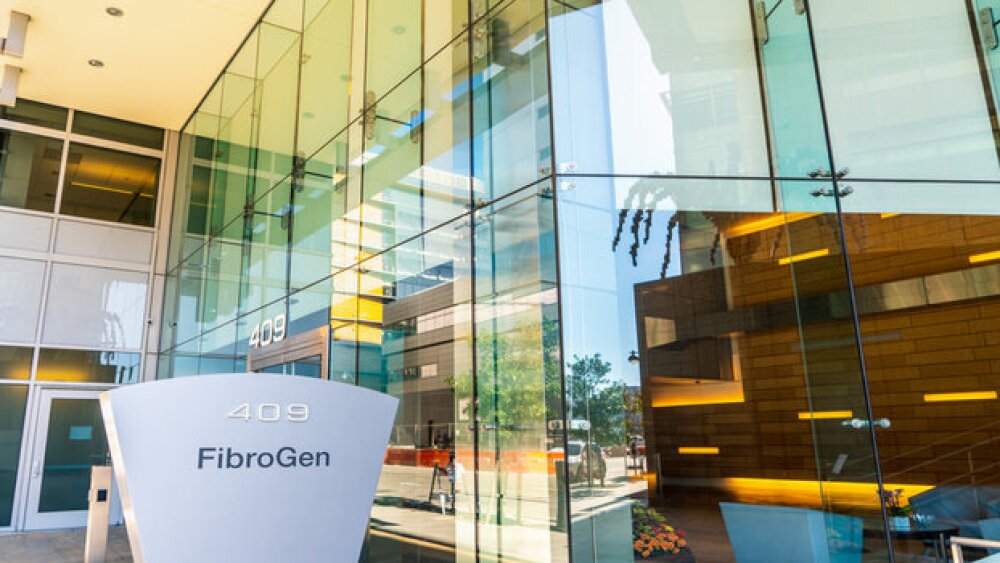Following a handful of clinical failures and changes to its leadership, FibroGen is trying to chart a more positive path forward by focusing on four strategic areas.
Pictured: FibroGen signage at its headquarters in California/iStock, Sundry Photography
FibroGen endured clinical setbacks and a leadership shake-up in recent months, but the California biotech remains optimistic about its path forward, the company said Monday during its second-quarter 2023 earnings report.
In particular, FibroGen will focus on what interim CEO Thane Wettig calls its “four strategic pillars” to help the company maximize shareholder value. First of these pillars is its Phase III candidate pamrevlumab, which is currently being developed for Duchenne muscular dystrophy (DMD) and locally advanced pancreatic cancer.
The investigational antibody, designed to target the CTGF protein, hit a rough patch during the second quarter, suffering Phase III failures in DMD and idiopathic pulmonary fibrosis in June. The latter was especially tough and forced FibroGen to abandon the development of pamrevlumab in this indication.
The company now hopes to turn pamrevlumab’s situation around with three upcoming late-stage readouts, including one in ambulatory DMD in the third quarter of this year and two in pancreatic cancer in the first half of 2024.
FibroGen’s second pillar is roxadustat, a first-in-class small molecule inhibitor of the HIF-PH protein approved in several territories for the treatment of anemia in chronic kidney disease. The second quarter of 2023 has seen record Roxadustat sales in China, where the drug made a total of $76.4 million, up 44% from its $53.1 million sales figure during the same period the year before.
Roxadustat is not approved in the U.S., after the FDA rejected its application in August 2021, citing safety signals. In May 2023, the candidate failed the Phase III MATTERHORN trial in myelodysplastic syndrome.
Still, FibroGen is looking to continue to strengthen its roxadustat business, particularly in China, where it is preparing to apply a supplemental New Drug Application for the drug in chemotherapy-induced anemia and expects a potential approval mid-2024.
Bolstering FibroGen’s two most mature assets is a robust early-stage oncology pipeline, which includes FG-3246, an anti-CD46 monoclonal antibody that it in-licensed from Fortis Therapeutics in May 2023. The candidate is being developed for metastatic castration-resistant prostate cancer and other solid tumors, and has best-in-class and first-in-class potential. Data
FibroGen currently has two Phase I studies for FG-3246, with findings expected starting late this year through 2024. A Phase II study is also being planned with data out 2026.
“We believe there are few biotechnology companies of our market cap that have such a compelling mix of commercial, late-stage and early-stage assets,” Wettig said during an investor call Monday, adding that this balance puts FibroGen in a good place to create significant shareholder value moving forward.
To support the advancement of its pipeline is FibroGen’s fourth strategic pillar—its cash position. As of June 30, 2023, its cash—defined as cash, cash equivalents, investments, and accounts receivable—was $361.3 million. FibroGen expects its cash, cash equivalents, investments and accounts receivable to support its operations into 2026.
The company posted $44.3 million in total revenue in the second quarter of 2023 as compared with $29.8 million during the same period the year before, representing a 49% increase. FibroGen anticipates its operating expense savings to ramp up over the next three quarters.
Tristan Manalac is an independent science writer based in Metro Manila, Philippines. He can be reached at tristan@tristanmanalac.com or tristan.manalac@biospace.com.






